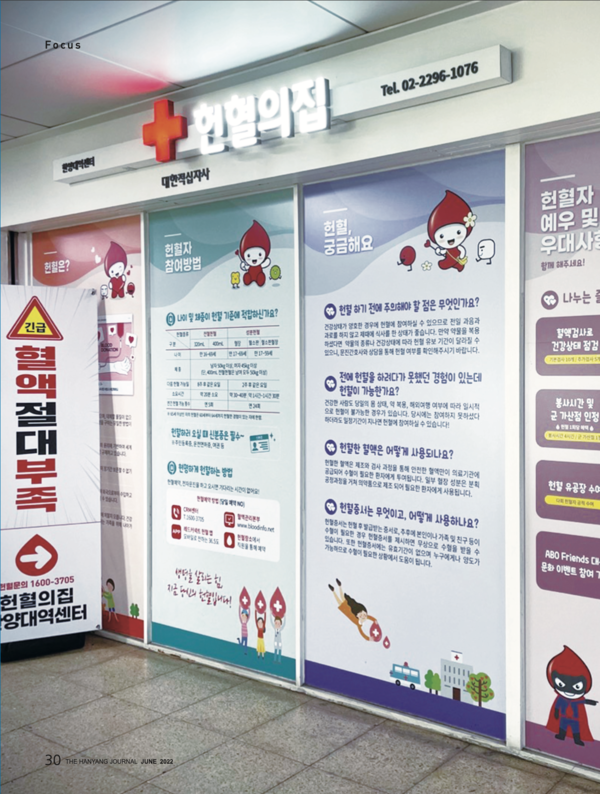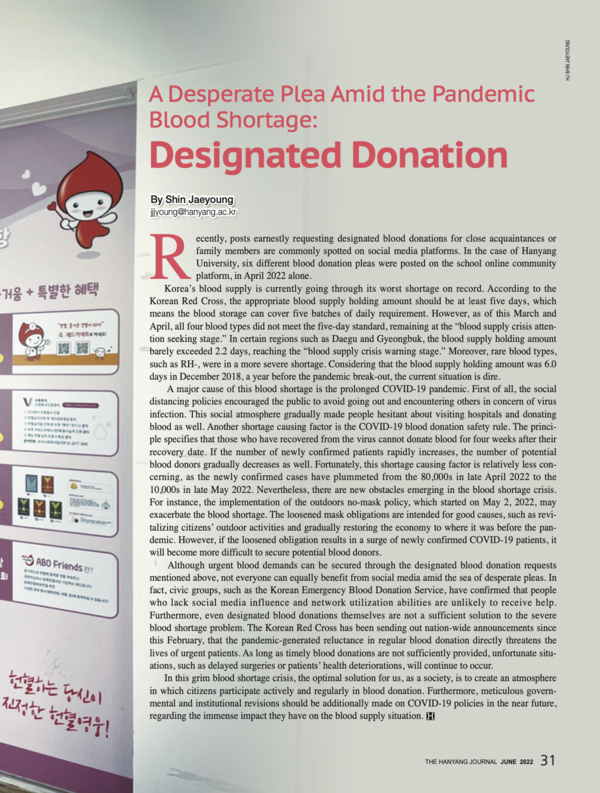Recently, posts earnestly requesting designated blood donations for close acquaintances or family members are commonly spotted on social media platforms. In the case of Hanyang University, six different blood donation pleas were posted on the school online community platform, in April 2022 alone.
Korea’s blood supply is currently going through its worst shortage on record. According to the Korean Red Cross, the appropriate blood supply holding amount should be at least five days, which means the blood storage can cover five batches of daily requirement. However, as of this March and April, all four blood types did not meet the five-day standard, remaining at the “blood supply crisis attention seeking stage.” In certain regions such as Daegu and Gyeongbuk, the blood supply holding amount barely exceeded 2.2 days, reaching the “blood supply crisis warning stage.” Moreover, rare blood types, such as RH-, were in a more severe shortage. Considering that the blood supply holding amount was 6.0 days in December 2018, a year before the pandemic break-out, the current situation is dire.
A major cause of this blood shortage is the prolonged COVID-19 pandemic. First of all, the social distancing policies encouraged the public to avoid going out and encountering others in concern of virus infection. This social atmosphere gradually made people hesitant about visiting hospitals and donating blood as well. Another shortage causing factor is the COVID-19 blood donation safety rule. The principle specifies that those who have recovered from the virus cannot donate blood for four weeks after their recovery date. If the number of newly confirmed patients rapidly increases, the number of potential blood donors gradually decreases as well. Fortunately, this shortage causing factor is relatively less concerning, as the newly confirmed cases have plummeted from the 80,000s in late April 2022 to the 10,000s in late May 2022. Nevertheless, there are new obstacles emerging in the blood shortage crisis. For instance, the implementation of the outdoors no-mask policy, which started on May 2, 2022, may exacerbate the blood shortage. The loosened mask obligations are intended for good causes, such as revitalizing citizens’ outdoor activities and gradually restoring the economy to where it was before the pandemic. However, if the loosened obligation results in a surge of newly confirmed COVID-19 patients, it will become more difficult to secure potential blood donors.
Although urgent blood demands can be secured through the designated blood donation requests mentioned above, not everyone can equally benefit from social media amid the sea of desperate pleas. In fact, civic groups, such as the Korean Emergency Blood Donation Service, have confirmed that people who lack social media influence and network utilization abilities are unlikely to receive help. Furthermore, even designated blood donations themselves are not a sufficient solution to the severe blood shortage problem. The Korean Red Cross has been sending out nation-wide announcements since this February, that the pandemic-generated reluctance in regular blood donation directly threatens the lives of urgent patients. As long as timely blood donations are not sufficiently provided, unfortunate situations, such as delayed surgeries or patients’ health deteriorations, will continue to occur.
In this grim blood shortage crisis, the optimal solution for us, as a society, is to create an atmosphere in which citizens participate actively and regularly in blood donation. Furthermore, meticulous governmental and institutional revisions should be additionally made on COVID-19 policies in the near future, regarding the immense impact they have on the blood supply situation.



